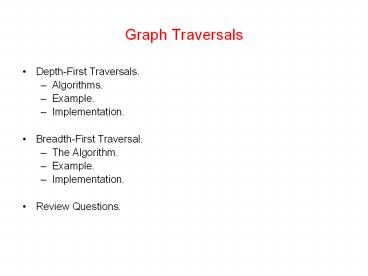Graph Traversals - PowerPoint PPT Presentation
Title: Graph Traversals
1
Graph Traversals
- Depth-First Traversals.
- Algorithms.
- Example.
- Implementation.
- Breadth-First Traversal.
- The Algorithm.
- Example.
- Implementation.
- Review Questions.
2
Depth-First Traversal Algorithm
- In this method, After visiting a vertex v, which
is adjacent to w1, w2, w3, ... Next we visit
one of v's adjacent vertices, w1 say. Next, we
visit all vertices adjacent to w1 before coming
back to w2, etc. - Must keep track of vertices already visited to
avoid cycles. - The method can be implemented using recursion or
iteration. - The iterative preorder depth-first algorithm is
- 1 push the starting vertex onto the stack
- 2 while(stack is not empty)
- 3 pop a vertex off the stack, call it v
- 4 if v is not already visited, visit it
- push vertices adjacent to v, not visited,
onto the stack
- Note Adjacent vertices can be pushed in any
order but to obtain a unique - traversal, we will push them in reverse
alphabetical order.
3
Example
- Demonstrates depth-first traversal using an
explicit stack.
4
Recursive preorder Depth-First Traversal
Implementation
dfsPreorder(v) visit v for(each
neighbour w of v) if(w has not been
visited) dfsPreorder(w)
- The following is the code for the recursive
preorderDepthFirstTraversal method of the
AbstractGraph class
public void preorderDepthFirstTraversal(Visitor
visitor, Vertex start) boolean visited
new booleannumberOfVertices for(int v 0
v lt numberOfVertices v) visitedv
false preorderDepthFirstTraversal(visitor,
start, visited)
5
Recursive preorder Depth-First Traversal
Implementation (contd)
- private void preorderDepthFirstTraversal(Visitor
visitor, - Vertex v, boolean
visited) - if(visitor.isDone())
- return
- visitor.visit(v)
- visitedgetIndex(v) true
- Iterator p v.getSuccessors()
- while(p.hasNext())
- Vertex to (Vertex) p.next()
- if(! visitedgetIndex(to))
- preorderDepthFirstTraversal(visitor, to,
visited)
6
Recursive preorder Depth-First Traversal
Implementation (contd)
At each stage, a set of unvisited adjacent
vertices of the current vertex is generated.
7
Recursive postorder Depth-First Traversal
Implementation
dfsPostorder(v) mark v for(each
neighbour w of v) if(w is not marked)
dfsPostorder(w) visit v
- The following is the code for the recursive
postorderDepthFirstTraversal method of the
AbstractGraph class
- public void postorderDepthFirstTraversal(Visitor
visitor, - Vertex
start) - boolean visited new booleannumberOfVertice
s - for(int v 0 v lt numberOfVertices v)
- visitedv false
- postorderDepthFirstTraversal(visitor, start,
visited)
8
Recursive postorder Depth-First Traversal
Implementation (contd)
- private void postorderDepthFirstTraversal(
- Visitor visitor, Vertex v, boolean
visited) - if(visitor.isDone())
- return
- // mark v
- visitedgetIndex(v) true
- Iterator p v.getSuccessors()
- while(p.hasNext())
- Vertex to (Vertex) p.next()
- if(! visitedgetIndex(to))
- postorderDepthFirstTraversal(visitor,
to, visited) - // visit v
- visitor.visit(v)
9
Recursive postorder Depth-First Traversal
Implementation (contd)
At each stage, a set of unmarked adjacent
vertices of the current vertex is generated.
10
Breadth-First Traversal Algorithm
- In this method, After visiting a vertex v, we
must visit all its adjacent vertices w1, w2, w3,
..., before going down next level to visit
vertices adjacent to w1 etc. - The method can be implemented using a queue.
- A boolean array is used to ensure that a vertex
is enqueued only once.
- 1 enqueue the starting vertex
- 2 while(queue is not empty)
- 3 dequeue a vertex v from the queue
- 4 visit v.
- enqueue vertices adjacent to v that were
never enqueued
- Note Adjacent vertices can be enqueued in any
order but to obtain a unique - traversal, we will enqueue them in
alphabetical order.
11
Example
- Demonstrating breadth-first traversal using a
queue.
12
Breadth-First Traversal Implementation
- public void breadthFirstTraversal(Visitor
visitor, Vertex start) - boolean enqueued new booleannumberOfVertic
es - for(int i 0 i lt numberOfVertices i)
enqueuedi false - Queue queue new QueueAsLinkedList()
- enqueuedgetIndex(start) true
- queue.enqueue(start)
- while(!queue.isEmpty() !visitor.isDone())
- Vertex v (Vertex) queue.dequeue()
- visitor.visit(v)
- Iterator it v.getSuccessors()
- while(it.hasNext())
- Vertex to (Vertex) it.next()
- int index getIndex(to)
- if(!enqueuedindex)
- enqueuedindex true
- queue.enqueue(to)
13
Review Questions
- 1. Considera depth-first traversal of the
undirected graph GA shown above, starting from
vertex a. - List the order in which the nodes are visited in
a preorder traversal. - List the order in which the nodes are visited in
a postorder traversal - 2. Repeat exercise 1 above for a depth-first
traversal starting from vertex d. - 3. List the order in which the nodes of the
undirected graph GA shown above are visited by a
breadth first traversal that starts from vertex
a. Repeat this exercise for a breadth-first
traversal starting from vertex d. - 4. Repeat Exercises 1 and 3 for the directed
graph GB.































